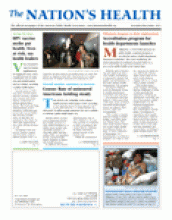Violence during pregnancy linked to low birthweight infants
Pregnant women who are assaulted by an intimate partner are at higher risk of giving birth to infants weighing less than 5.5 pounds, according to a study published online in the Journal of Human Resources.
The study, sponsored by the National Institutes of Health, compared birth records in California between 1991 and 2002 to the records of pregnant women hospitalized as a result of injuries from assault. Study author Anna Aizer, PhD, of Brown University, found that for every 100,00 women who gave birth during that timeframe, 31 had been hospitalized for an assault injury while pregnant, 87 percent of them the victim of intimate partner violence.
The study also found that among infants born to mothers who had been assaulted while pregnant, about 15 percent weighed less than 5.5 pounds, which is considered low birthweight. The rate was higher than that of low birthweight among pregnant women who were hospitalized after a car crash or for other injuries, and more than double the rate among women who were not hospitalized while pregnant.
“The costs of violence against women may be borne not just by the victims but by the next generation as well,” Aizer said. “Given the importance of birth weight in determining adult education and income, these results suggest that the higher levels of violence experienced by poor women may also contribute to the intergenerational persistence of poverty.”
IUD use can cut cervical cancer risk
Intrauterine device may protect women against cervical cancer, according to a recent study.
Previous studies have linked IUD use with lowered risk of endometrial cancer, and a study published online Sept. 12 in the Lancet Oncology found women with a history of using IUDs had almost half the risk of developing cervical cancer as women who had never used the devices.
The study was based on an analysis of data from 10 case-controlled studies of cervical cancer conducted in eight countries and 16 human papillomavirus prevalence surveys in women from four continents. Findings were adjusted for such factors as number of Pap smears, number of sexual partners and age at first intercourse.
IUD use did not affect the risk of HPV infection, according to the study, but was associated with a significantly lower risk of cervical cancer — 44 percent lower risk for developing squamous-cell carcinoma and 54 percent lower risk of developing adenocarcinoma or adenosquamous carcinoma. Length of IUD use did not significantly alter cervical cancer risk.
Among the theories as to why IUD use appears to significantly lower cervical cancer risk is that the process of device insertion or removal destroys precancerous lesions or the device induces inflammation and a long-lasting immune response that reduces the likelihood of HPV progression. Persistent HPV infection is the cause of “essentially all cervical cancers,” according to the National Cancer Institute. This year more than 12,000 women in the United States are expected to be diagnosed with cervical cancer and about 4,000 of them will die from it.
Free FDA toolkit helps food emergency response
Government regulators, public health organizations and the food industry can test their readiness for food-related emergencies through a new free toolkit from the U.S. Food and Drug Administration.
The aim of the toolkit, known as the Food Related Emergency Exercise Boxed Set, is to help emergency preparedness planners and food and agriculture stakeholders better collaborate with each other and neighboring jurisdictions, the food industry and federal agencies during food emergencies. Such emergencies could include a human health threat caused by an unintentional contamination of produce with E. coli.
“Being prepared for any kind of emergency is critical to a rapid and effective response,” said Michael R. Taylor, JD, FDA’s deputy commissioner for foods. “FREE-B helps people think about their own responsibilities in a time of crisis and how to best work with others involved.”
FDA officials developed the toolkit with the help of experts from the Centers for Disease Control and Prevention and the U.S. Department of Agriculture’s Food Safety and Inspection Service and Plant Health Inspection Service. The test scenarios include one focusing on the investigation that occurs after standard product testing shows a food product contains an excessive level of a contaminant and another focusing on the investigation of animal disease caused by intentional infection of cattle with Foot and Mouth Disease virus.
The toolkit is online at www.fda.gov.
- Copyright The Nation’s Health, American Public Health Association









